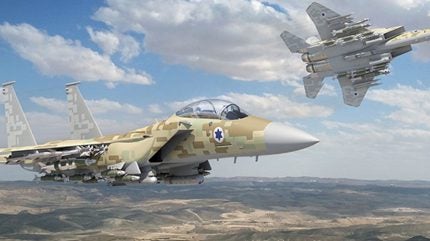
In a move emphasising US support for Israel’s defence capabilities, the US administration has approved a series of Foreign Military Sales (FMS) to Israel valued at more than $20bn (NIS75.5bn).
The approvals, including fighter jets, missiles, and other defence equipment, were announced on August 13, 2024, following apparent delays in the FMS approval process.
Impact on military sales to Israel
Among the sales approved were 50 F-15IA multi-role fighter aircraft and upgrade kits for Israel’s existing fleet of F-15I jets, estimated at $18.82bn. These aircraft, manufactured by Boeing, will bolster Israel’s air capabilities, enhancing its deterrence posture amidst growing threats in the Middle East. The approval also includes 30 AIM-120C-8 Advanced Medium Range Air-to-Air Missiles (AMRAAM) for aerial combat, estimated to cost $102.5m.
In addition to the aerial capabilities, the US approved a $774.1m sale of 32,739 120mm tank cartridges, enhancing the firepower of Israel’s armoured divisions. This was accompanied by a $583.1m sale of modified M1148A1P2 Family of Medium Tactical Vehicles (FMTVs), providing Israel’s ground forces with logistical and tactical support capabilities.
These approvals come after a notable period of stagnation in the FMS process. There was a “logjam” in the approval process, possibly linked to the broader dynamics of US foreign policy.
The series of approvals, however, signals a renewed focus on reinforcing Israel’s military capabilities. “The United States is committed to the security of Israel,” the State Department stated in its notifications to Congress, emphasising the importance of these sales.
For Israel, these approvals reaffirm the US commitment and boost its defence modernisation efforts, which are essential given the evolving threats from regional adversaries.
Iran is expected to launch a large-scale retaliatory attack on Israel following the Israeli killing of Hamas leader Ismail Haniyeh in Tehran.
Strengthening US-Israel defence cooperation
In Israel, US law is committed to supplying the most advanced military equipment and technology to ensure a qualitative Israel advantage, as highlighted by GlobalData’s intelligence on the US defence market. Since the 2023 Israel-Hamas War began, the US government has reaffirmed its support to Israel and expanded sanctions against Hamas and Hamas supporters.
The Israeli defence industry is robust, with collaboration and commercial activity with the United States. According to GlobalData’s report on the Israeli defence market, Bell Textron, Boeing, Hughes, Lockheed Martin, Raytheon and Sikorsky Aircraft Corporation are all US defence companies that have entered the Israeli defence market through extensive military sales programs.
Amid ongoing conflict and increasing security challenges, Israel relies on its domestic defence industry, mainly through long-term contracts with Elbit Systems. Elbit has secured a $340m deal to supply the Israeli Ministry of Defense with ammunition over the next decade, including plans to build a new munitions plant in Israel. Additionally, Elbit has recently awarded a $190m contract to provide precision-guided mortar munitions.
Introducing new fighter jets, missile systems, and tactical vehicles will enhance the Israel Defense Forces’ operational readiness and ability to deter and respond to potential threats.
With these approvals now in hand, Israel can proceed with its defence procurement plans, though the finalisation of contracts and actual deliveries will take place over the coming years. The first F-15IA aircraft, for example, is not expected to arrive until 2029, while deliveries of other equipment like tank cartridges and tactical vehicles will begin in 2026 and 2027.
As these deals move forward, the focus will likely shift to how Israel integrates these systems into its existing military infrastructure and their potential impact on the region’s balance. For now, clearing the FMS logjam marks a step in US-Israel defence cooperation, reaffirming a partnership that continues to shape the Middle East.




